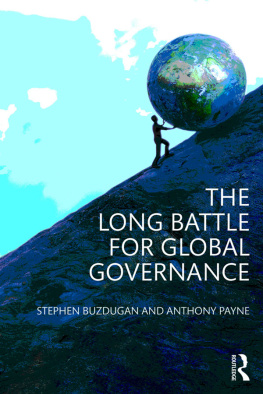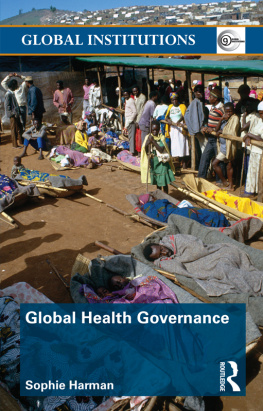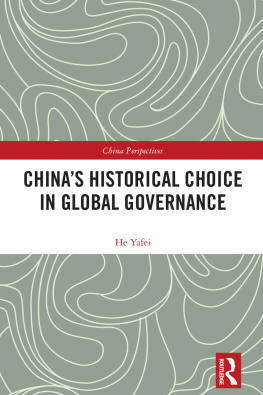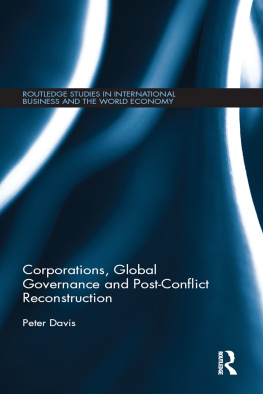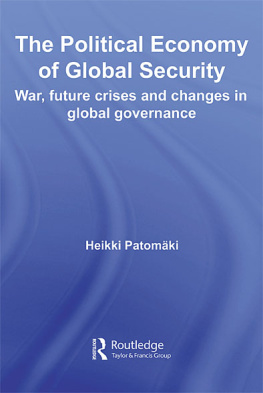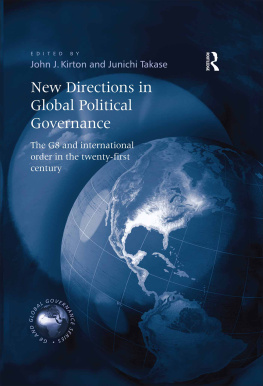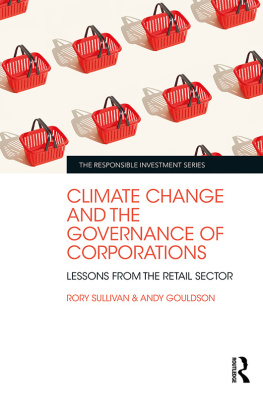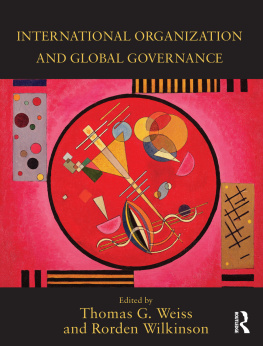Global Corporations in Global Governance
This book offers a concise and accessible overview and analysis of the place of large multinational and regional corporations in the political economy of global governance. May argues that not only do corporations have an impact on the institutions of global governance, but they must be understood as a multifaceted institution of global governance in their own right, controlling and shaping significant aspects of the global political economy.
Topics include:
- What are global corporations?
- Corporations and global governance
- The legal personality of the corporation
- Corporations and power
- Corporations and tax
- The future role of corporations in a post crisis global system
Highlighting the central role of corporations in the generation and reproduction of norms in global governance, this work shows that corporations practices and relations are themselves both subjects, and sources of, global governance. It offers an enhanced understanding of the complex of issues that pattern corporate global governance in the contemporary political economy and will be of interest to students in areas including IPE, global governance, and international organizations.
Christopher May is Professor of Political Economy at Lancaster University, UK.
Global Institutions
Edited by Thomas G. Weiss
The CUNY Graduate Center, New York, USA
and Rorden Wilkinson
University of Sussex, Brighton, UK
About the series
The Global Institutions Series provides cutting-edge books about many aspects of what we know as global governance. It emerges from our shared frustrations with the state of available knowledgeelectronic and print-wise, for research and teachingin the area. The series is designed as a resource for those interested in exploring issues of international organization and global governance. And since the first volumes appeared in 2005, we have taken significant strides toward filling conceptual gaps.
The series consists of three related streams distinguished by their blue, red, and green covers. The blue volumes, comprising the majority of the books in the series, provide user-friendly and short (usually no more than 50,000 words) but authoritative guides to major global and regional organizations, as well as key issues in the global governance of security, the environment, human rights, poverty, and humanitarian action among others. The books with red covers are designed to present original research and serve as extended and more specialized treatments of issues pertinent for advancing understanding about global governance. And the volumes with green coversthe most recent departure in the seriesare comprehensive and accessible accounts of the major theoretical approaches to global governance and international organization.
The books in each of the streams are written by experts in the field, ranging from the most senior and respected authors to first-rate scholars at the beginning of their careers. In combination, the three components of the seriesblue, red, and greenserve as key resources for faculty, students, and practitioners alike. The works in the blue and green streams have value as core and complementary readings in courses on, among other things, international organization, global governance, international law, international relations, and international political economy; the red volumes allow further reflection and investigation in these and related areas.
The books in the series also provide a segue to the foundation volume that offers the most comprehensive textbook treatment available dealing with all the major issues, approaches, institutions, and actors in contemporary global governanceour edited work International Organization and Global Governance (2014)a volume to which many of the authors in the series have contributed essays.
Understanding global governancepast, present, and futureis far from a finished journey. The books in this series nonetheless represent significant steps toward a better way of conceiving contemporary problems and issues as well as, hopefully, doing something to improve world order. We value the feedback from our readers and their role in helping shape the on-going development of the series.
A complete list of titles appears at the end of this book. The most recent titles in the series are:
The United Nations Centre on Transnational Corporations (2015)
by Khalil Hamdani and Lorraine Ruffing
The Challenges of Constructing Legitimacy in Peacebuilding (2015)
by Daisaku Higashi
The European Union and Environmental Governance (2015)
by Henrik Selin and Stacy D. VanDeveer
Rising Powers, Global Governance, and Global Ethics (2015)
edited by Jamie Gaskarth
Wartime Origins and the Future United Nations (2015)
edited by Dan Plesch and Thomas G. Weiss
International Judicial Institutions (2nd edition, 2015)
by Richard J. Goldstone and Adam M. Smith
The NGO Challenge for International Relations Theory (2015)
edited by William E. DeMars and Dennis Dijkzeul
First published 2015
by Routledge
2 Park Square, Milton Park, Abingdon, Oxon OX14 4RN
and by Routledge
711 Third Avenue, New York, NY 10017
Routledge is an imprint of the Taylor & Francis Group, an informa business
2015 Christopher May
The right of Christopher May to be identified as the author of this work has been asserted by him in accordance with the Copyright, Designs and Patent Act 1988.
All rights reserved. No part of this book may be reprinted or reproduced or utilised in any form or by any electronic, mechanical, or other means, now known or hereafter invented, including photocopying and recording, or in any information storage or retrieval system, without permission in writing from the publishers.
Trademark notice: Product or corporate names may be trademarks or registered trademarks, and are used only for identification and explanation without intent to infringe.
British Library Cataloguing in Publication Data
A catalogue record for this book is available from the British Library
Library of Congress Cataloging in Publication Data
May, Christopher N.
Global corporations in global governance / Christopher May.
pages cm. (Routledge global institutions series ; 99)
Includes bibliographical references and index.
1. Corporate governanceInternational cooperation. 2. Global governance. 3. International business enterprisesPolitical aspects. I. Title.
HD2741.M34 2015
338.88dc23
2014037817
ISBN: 9780415716031 (hbk)
ISBN: 9780415716055 (pbk)
ISBN: 9781315880204 (ebk)
Having worked in the private sector before I joined the academy, I have always maintained an interest in the corporate sector, prompting me some years ago to edit Global Corporate Power when serving as co-series editor of the IPE Yearbooks series. Although my main research has now moved from a focus on intellectual property rights to the question of the normative role of the idea of the rule of law, I have maintained this interest in the political economy of the corporate sector. This book is the result of a conversation between Rorden Wilkinson (one of the series editors) and myself, and builds on my teaching a course at Lancaster University on corporations. A previous book



